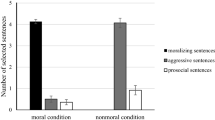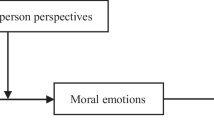Abstract
In light of the current relevance of analyzing the motivational determinants of prosocial behaviors, an experimental design was applied to examine the influence of rejection sensitivity, affective states, and trust on prosocial behavior in the included versus excluded context. The research was performed at a Spanish university with a sample of 118 students. The results confirm that excluded individuals are more prosocial than included individuals only when they see reconnection as possible (hopeful excluded individuals). The inclusion/exclusion experience moderated (1) the links between rejection sensitivity and both affective states and prosocial behavior, and (2) the mediation of trust between affective states and prosocial behavior. Finally, a predictive model of prosocial behavior moderated by the type of inclusion or exclusion was partially supported. Results indicate the relevance of promoting different variables in included individuals, hopeful excluded individuals, and hopeless excluded individuals for prosocial behavior.


Similar content being viewed by others
References
Ayduk, Ö., Downey, G., Testa, A., Yen, Y., & Shoda, Y. (1999). Does rejection elicit hostility in rejection sensitive women? Social Cognition, 17, 245–271.
Ayduk, Ö., Gyurak, A., & Luerssen, A. (2008). Individual differences in the rejection-aggression link in the hot sauce paradigm: The case of rejection sensitivity. Journal of Experimental Social Psychology, 44(3), 775–782.
Baker, F., Denniston, M., Zabora, J., Polland, A., & Dudley, W. (2002). A POMS short form for cancer patients: Psychometric and structural evaluation. Psycho-Oncology, 11(4), 273–281.
Bartlett, M. I., & DeSteno, D. (2006). Gratitude and prosocial behavior. Helping when it costs you. Psychological Sciences, 17(4), 319–325.
Bastian, B., & Hasslam, N. (2010). Excluded from humanity: The dehumanizing effects of social ostracism. Journal of Experimental Social Psychology, 46, 107–113.
Baumeister, R. F., DeWall, C. N., Ciarocco, N. J., & Twenge, J. M. (2005). Social exclusion impairs self-regulation. Journal of Personality and Social Psychology, 88(4), 589–604.
Berigan, N., & Irwin, K. (2011). Culture, cooperation, and the general welfare. Social Psychology Quarterly, 74(4), 341–360.
Bernstein, M. J., Sacco, D. F., Brown, C. M., Young, S. G., & Claypool, H. M. (2010). A preference for genuine smiles following social exclusion. Journal of Experimental Social Psychology, 46, 196–199.
Blackhart, G. C., Eckel, L. A., & Tice, D. M. (2007). Salivary cortisol in response to acute social rejection and acceptance by peers. Biological Psychology, 75, 267–276.
Blackhart, G. C., Nelson, B. C., Knowles, M. L., & Baumeister, R. F. (2009). Rejection elicits emotional reactions but neither causes immediate distress nor lowers self-esteem: A meta-analytic review of 192 studies on social exclusion. Personality and Social Psychology Review, 13(4), 269–309.
Buckley, K., Winkel, R., & Leary, M. (2004). Reactions to acceptance and rejection: Effects of level and sequence of relational evaluation. Journal of Experimental Social Psychology, 40(1), 14–28.
Byrne, B. M. (2009). Structural equation modeling with Amos. Basic concepts applications and programming. New York: Routledge.
Chow, R. M., Tiedens, L. Z., & Govan, C. (2008). Excluded feelings: Emotional responses to social ostracism predict aggressive reactions. Journal of Experimental Social Psychology, 44, 896–903.
Coyne, S. M., Gundersen, N., Nelson, D., & Stockdale, L. (2011). Adolescents’ prosocial responses to ostracism: An experimental study. Social Psychology, 151(5), 657–661.
De Dreu, C. K. W., Greer, L. L., Handgraaf, M. J. J., Shalvi, S., Van Kleef, G. A., Baas, M., et al. (2010). The neuropeptide oxytocin regulates parochial altruism in intergroup conflict among humans. Science, 328(5984), 1408–1411.
Derfler-Rozin, R., Pillutla, M., & Thau, S. (2010). Social reconnection revisited: The effects of social exclusion risk on reciprocity, trust, and general risk-taking. Organizational Behavior and Human Decision Processes, 112, 140–150.
Dickert, S., Sagara, N., & Slovic, P. (2011). Affective motivation to help others: A two-stage model of donation decision. Journal of Behavioral Decision Making, 24(4), 361–371.
Dunn, J. R., & Schweitzer, M. E. (2005). Feeling and believing: The influence of emotion on trust. Journal of Personality and Social Psychology, 88(5), 736–748.
Greenhalgh, L., & Chapman, D. I. (1998). Negotiator relationships: Construct measurement, and demonstration of their impact on the process and outcomes of negotiation. Group Decision and Negotiation, 7, 465–489.
Jones, G. R., & George, J. M. (1998). The experience and evolution of trust: Implications for cooperation and teamwork. The Academy of Management Review, 23(3), 531–546.
Leach, C. W., Iyer, A., & Pedersen, A. (2006). Anger and guilt about in-group advantage explain the willingness for political action. Personality and Social Psychology Bulletin, 32, 1232–1245.
Leary, M. R., & Leder, S. (2009). The nature of hurt feelings: Emotional experience and cognitive appraisals. In A. L. Vangellisti (Ed.), Feeling hurt in close relationships (pp. 15–33). New York: Cambridge University Press.
Lee, J., & Shrum, L. J. (2012). Conspicuous consumption versus charitable behavior in response to social exclusion: A differential needs explanation. Journal of Consumer Research, 39, 1–17.
Lerner, J. S., & Tiedens, L. Z. (2006). Portrait of the angry decision maker: How appraisal tendencies shape anger’s influence on cognition. Journal of Behavioral Decision Making, 19(2), 115–137.
Little, T. D., Card, N. A., Bovaird, J. A., Preacher, K., & Crandall, C. S. (2007). Structural equation modeling of mediation and moderation with contextual factors. In T. D. Little, J. A. Bovaird, & N. A. Card (Eds.), Modeling contextual effects in longitudinal studies. Mahwah, NJ: Erlbaum.
Maner, J. K., DeWall, C. N., Baumeister, R. F., & Schaller, M. (2007). Does social exclusion motivate interpersonal reconnection? Resolving the ‘porcupine problem’. Journal of Personality and Social Psychology, 92(1), 42–55.
Mead, N. L., Stillman, T. F., Vohs, K. D., Rawn, C. D., & Baumeister, R. L. (2010). Reconnection through consumption: Socially excluded people adapt consumption patterns to foster affiliation. In A. Duhachek & M. Meloy (Eds.), Advances in consumer psychology (pp. 45–47). St. Petersburg, FL: Society for Consumer Psychology.
Mendoza-Denton, R., Ayduk, O., Mischel, W., Shoda, Y., & Testa, A. (2001). Person X situation interactionism in self-encoding (I am… when…): Implications for affect regulation and social information processing. Journal of Personality and Social Psychology, 80(4), 533–544.
O’Malley, M. N., & Andrews, L. (1983). The effect of mood and incentives on helping: Are there some things money can’t buy? Motivation and Emotion, 7(2), 179–189.
Okun, M. A., Shepard, S. A., & Eisenberg, N. (2000). The relations of emotionality and regulation to dispositional empathy-related responding among volunteers-in-training. Personality and Individual Differences, 28(2), 367–382.
Pavey, L., Greitemeyer, T., & Sparks, P. (2011). Highlighting relatedness promotes prosocial motives and behavior. Personality and Social Psychology Bulletin, 37(7), 905–917.
Purdie, V., & Downey, G. (2000). Rejection sensitivity and adolescent girls’ vulnerability to relationship-centered difficulties. Child Maltreatment, 5, 338–349.
Romero-Canyas, R., Downey, G., Reddy, K. S., Rodríguez, S., Cavanaugh, T., & Pelayo, R. (2010). Paying to belong: When does rejection trigger ingratiation? Journal of Personality and Social Psychology, 99, 802–823.
Ronen, S., & Baldwin, M. W. (2010). Hypersensitivity to social rejection and perceived stress as mediators between attachment anxiety and future burnout: A prospective analysis. Applied Psychology: An International Review, 59(3), 380–403.
Rotenberg, K. J., Fox, C., Green, S., Ruderman, L., Slater, K., Stevens, K., & Carlo, G. (2005). Construction and validation of a children’s interpersonal trust belief scale. British Journal of Developmental Psychology, 23, 271–292.
Rusbult, C. E., & Agnew, C. R. (2010). Prosocial motivation and behavior in close relationships. In M. Mikulincer & P. R. Shaver (Eds.), Prosocial motives, emotions, and behavior: The better angels of our nature (pp. 327–345). Washington, DC: American Psychological Association.
Shrout, P. E., & Bolger, N. (2002). Mediation in experimental and nonexperimental studies: New procedures and recommendations. Psychological Methods, 7(4), 422–445.
Simpson, B., Irwin, K., & Lawrence, P. (2006). Does a “norm of self-interest” discourage prosocial behavior? Rationality and quid pro quo in charitable giving. Social Psychology Quarterly, 69(3), 296–306.
Smart Richman, L., & Leary, R. M. (2009). Reactions to discrimination, stigmatization, ostracism, and other forms of interpersonal rejection: A multimotive model. Psychological Review, 116, 365–383.
Twenge, J. M., Baumeister, R. F., DeWall, N. C., Ciarocco, N. J., & Bartels, J. M. (2007). Social exclusion decreases prosocial behavior. Journal of Personality and Social Psychology, 92, 56–66.
Twenge, J. M., Baumeister, R. F., Tice, D. M., & Stucke, T. S. (2001). If you can’t join them, beat them: Effects of social exclusion on aggressive behavior. Journal of Personality and Social Psychology, 81(6), 1058–1069.
Twenge, J. M., & Campbell, W. K. (2003). Isn’t it fun to get the respect that we’re going to deserve? Narcissism, social rejection, and aggression. Personality and Social Psychology Bulletin, 29, 261–272.
Twenge, J. M., Catanese, K. R., & Baumeister, R. F. (2003). Social exclusion and the deconstructed state: Time perception, meaninglessness, lethargy, lack of emotion, and self-awareness. Journal of Personality and Social Psychology, 85, 409–423.
Vitaglione, G. D., & Barnett, M. A. (2003). Assessing a new dimension of empathy: Empathic anger as a predictor of helping and punishing desires. Motivation and Emotion, 27(4), 301–325.
Vollhardt, J. R. (2009). Altruism born of suffering and prosocial behavior following adverse life events: A review and conceptualization. Social Justice Research, 22(1), 53–97.
Wang, L., Northcraft, G. B., & Van Kleef, G. A. (2012). Beyong negotiated outcomes: The hidden costs of anger expression in dyadic negotiation. Organizational Behavior and Human Decision Processes, 119(1), 54–63.
Watson, D., Clark, L., & Tellegen, T. (1988). Development and validation of brief measures of positive and negative affect: The PANAS scales. Journal of Personality and Social Psychology, 54, 1063–1070.
Weinstein, N., & Ryan, R. M. (2010). When helping helps: Autonomous motivation for prosocial behavior and its influence on well-being for the helper and recipient. Journal of Personality and Social Psychology, 98(2), 222–224.
Williams, K. D. (2007). Ostracism. Annual Review of Psychology, 58(January), 425–452.
Acknowledgments
The data collection was financially supported by the Spanish Ministry of Science and Technology Grant number PSI 2009-07423, in which Carmen Tabernero is the main researcher. And the manuscript was written while Esther Cuadrado was a fellow doctoral researcher financially supported by the Spanish Educational Ministry within the framework of the National Program of university teacher training (2010–2014).
Author information
Authors and Affiliations
Corresponding author
Rights and permissions
About this article
Cite this article
Cuadrado, E., Tabernero, C. & Steinel, W. Motivational determinants of prosocial behavior: What do included, hopeful excluded, and hopeless excluded individuals need to behave prosocially?. Motiv Emot 39, 344–358 (2015). https://doi.org/10.1007/s11031-014-9460-z
Published:
Issue Date:
DOI: https://doi.org/10.1007/s11031-014-9460-z




